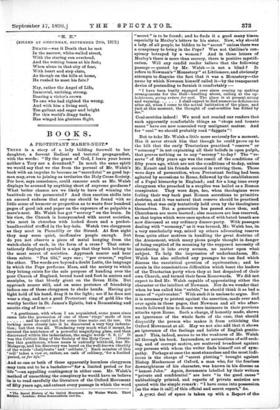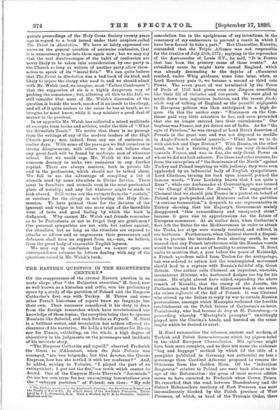BOOKS.
A PROTESTANT MARE'S-NEST.* THERE is a story of a lady bidding farewell to her daughter, a fervent Radical and teetotal propagandist, with the words : "By the grace of God, I leave your house neither a Tory nor a drunkard." In much the same spirit we would say that we rise from the perusal of Mr. Walsh's book with an impulse to become as " sacerdotal " as good lay- men may, even to joining as tertiaries the Holy Cross Society. For how, says conscience, could rancour such as Mr. Walsh displays be aroused by anything short of supreme goodness ?
What better chance are we likely to have of winning the beatitude on the persecuted ? And then emotion shifts into an amused sadness that any one should be found -vith so little sense of humour or proportion as to waste four hundred :pages of good ink and paper on the exposure of so palpable a mare's-nest. Mr. Walsh has got " secrecy " on the brain. In his view, the Church is honeycombed with secret societies, who meet in churches with locked doors and a pocket- 'handkerchief stuffed in the key-hole. Watch two clergymen as they meet in Piccadilly or the Strand. At first sight they may seem quiet, inoffensive people enough. But do you not observe a piece of metal hanging from the watch-chain of each, in the form of a cross That osten- tatiously displayed symbol is a sign that they both belong to the most secret of societies. Approach nearer and hear them salute. "Paz tibi," says one ; "per crucem," replies the other. The words are beyond a doubt Latin, the language in which the Pope performs Mass, and the society to which they belong exists for the sole purpose of handing over the poor Church of England, bound hand and foot in amines and maniples, to that bloody giant on the Seven Hills. But approach nearer still, and on some pretence of friendship induce one of these clergymen to shake hands. Having got tight hold of his hand, drag it to the light ; see if he does not wear a ring, and not a good Protestant ring of gold like the worthy brother in St. James's Epistle, but a Romanising and ascetic ring of iron ;—
"A gentleman, with whom I am acquainted, some years since came into the possession of one of these 'rings' made of iron and he could not for some time make out its use. On looking more closely into it he discovered a very tiny indenta- tion; but that was all. Wondering very much what it meant, he secured the assistance of a powerful magnifying glass, and then discovered within the indentation, the magic words S. S. C.' It was the Celibate Ring of the Society of the Holy Cross ! [Doubt- less this gentleman, whose name is unkindly withheld, was Mr. 'Malaprop, and his discovery was based on the well-known identity of the words chalybeate ' and g celibate.'] Each member of this
• 'roll' takes a vow or, rather, an oath of celibacy, for a limited
• period, or for We."
And so one or both of those apparently harmless clergymen may turn out to be a bachelor—" for a limited period or for 'life "—an appalling contingency in either ease. Mr. Waleh's
'method of unearthing the conspiracy he would have us believe lin is to read carefully the literature of the Oxford Movement )of fifty years ago, and extract every passage in which the word
1
The Secret Hiafory of the Oxford Movement. By Walter Walsh. Third Zdition. London: Swan Sonnensobein and Co.
" secret " is to be found ; and he finds it a good many times. especially in Mozley's letters to his sister. Now, why should a lady, of all people, be bidden to be " secret" unless there was a conspiracy to bring in the Pope? Was not Catiline's con- spiracy betrayed by a woman ? And in these letters of Mozley's there is more than secrecy, there is positive mystifi- cation. Will any candid reader believe that the following passage — quoted by Mr. Walsh — is not a blind ? It refers to Newman's " Monastery " at Littlemore, and obviously attempts to disguise the fact that it was a Monastery—the name by which Newman himself called it—by the transparent device of pretending to furnish it comfortably :—
" I have been busily engaged ever since coming up making arrangements for the Hall—bustling about, calling at the up- holsterers, giving orders for coal. The place is at present airing
and warming I shall expect to find numerous deficiencies after all, when I come to the actual habitation of the place, and just at this moment, the thought of coal-scuttles has flitted by me."
Coal-scuttles indeed ! We need not remind our readers that such apparently comfortable things as "chops and tomato sauce " have ere now concealed very malignant matter. And
for "coal" we should probably read "faggots "!
But to take Mr. Walsh a little more seriously for a moment.. Has it never struck him that though he could prove up to- the hilt that the early Tractarians practised " reserve " or " economy " in not explaining all their beliefs in open pulpit, that proves nothing as to any "secrecy" to-day ? The " re-
serve " of fifty years ago was the result of the conditions of' fifty years ago, which are not the conditions of to-day, unless.
Mr. Kensit and his friends succeed in reviving them. Those were days of persecution, when Protestant feeling had been.
agitated by secessions to Rome, followed by the establishment of a Papal hierarchy in England ; and for a long time every clergyman who preached in a surplice was hailed as a Roman
conspirator. They were days, too, when theologians were- feeling their way back past Roman accretions to primitive doctrine, and it was natural that reserve should be practised about what was only tentatively held even by the theologians,
themselves. But a generation has passed since then, and Churchmen are more learned ; also manners are less reserved, so that topics which were once spoken of with bated breath are now discussed at any ordinary dinner-party. With passages.. dealing with "economy," as it was termed, Mr. Walsh has, in, a very unscholarly way, mixed up others advocating reserve from quite other motives in handling the great doctrine of the Atonement, which many pions people thought in danger of being emptied of its meaning by the supposed necessity of introducing it into every sermon, no matter upon what subject. To help the impression of underhandness, Mr.
Walsh has also collected any passages he can find which discuss the casuistical question of equivocation ; and he- revels in the conscientious difficulties which beset the leaders- of the Tra,ctarian party when they at last despaired of their own Church, and turned their faces Romewards. We did not expect to find Mr. Walsh capable of appreciating either the character or the intellect of Newman. Nor do we wonder that when he has called him "subtle," he should think it as bad a. name of " equivocator." With such it is useless to argue. But it is necessary to protest against the assertion, made over and. over again in these pages, that Newman and all who after- wards followed him to Rome were insincere in their previous attacks upon Rome. Such a charge, if honestly made, shows an ignorance of the whole facts of the case, that should disqualify the person who makes it from criticising the Oxford Movement at all. May we not also add that it shows
A= ignorance of the feelings and habits of English gentle-
men? This, indeed, seems to us the weakness of Mr. Walsh, all through his book. Innuendoes, or accusations of self-seek- ing, and of corrupt motive, are scattered broadcast against. any persons with whom the writer finds himself out of sym-
pathy. Perhaps at once the most shameless and the most ludi- crous is the charge of "secret plotting" brought against Bishop Mackarness of Oxford, a man who, for the fearless downrightness of his character, was known in his diocese as "honest John." Again, documents labelled by their writers
"private and confidential" are here "in the good cause" unblushingly printed, and reports of private societies are quoted with the simple remark : "I have come into possession [so the wise it call] of this official and secret report," &a
A cr.!. deal of space is taken up with a. Report of the • private proceedings of the Holy Cross Society twenty years ago in regard to a book issued under their auspices called The Priest in Absolution. We have so lately expressed our • views on the general question of auricular confession, that it is unnecessary to go into them again now; but we may say that the real disadvantages of the habit of confession are never likely to be taken into consideration by one party in the Church so long as writers of another party allow them- selves to speak of its "moral filth." We can quite believe that The Priest in Absolution was a bad book of its kind, and likely to injure the clergy who used it, and we should admit with Mr. Walsh (and, we imagine, most "Father Confessors ") that the suggestion of sin is a highly dangerous way of 'probing the conscience ; but, allowing all this to the fall, we still consider that most of Mr. Walsh's discussion of the question is beside the mark, much of it an insult to the clergy, and all of it quite useless to the cause he has at heart, as we imagine he must know, while it may minister a good deal of matter to the prurient.
In an appendix Mr. Walsh has collected a mixed multitude of excerpts from books and articles, under the title of "What the Ritualists Teach." We notice that there is no passage from the writings of any of the modern leaders of the High Church party; nor, indeed, from any one of eminence in earlier days. With some of the passages we find ourselves in -strong disagreement, with others we do not believe that any great fault will be found by moderate men of whatever schooL But we would urge Mr. Walsh in the name of common decency to make two omissions in any further reprint. There are always matters, both in private life and in the professions, which should not be talked about. We fail to see the advantage of compiling a list of -utensils used by some ritualists in Divine Service. There must be furniture and utensils even in the most puritanical -place of worship ; and any list whatever might be made to look absurd. Still worse are the extracts from the " cantels," or cautions for the clergy in celebrating the Holy Com- munion. To have printed these for the derision of the ignorant and vulgar is but one more sign of the incredible want of taste and good feeling by which the book is disfigured. Why cannot Mr. Walsh and friends remember so to be Protestants as not to forget they are gentlemen ? Our personal sympathies are not with, but rather against, the ritualists, but as long as the ritualists are exposed to attacks so odious and so ungenerous their persecutors and defamers shall have no support from us,—nor, we believe, from the great body of reasonable English laymen.
We may say in conclusion that we cannot open our correspondence columns to letters dealing with any of the questions raised in Mr. Walsh's book.



































 Previous page
Previous page